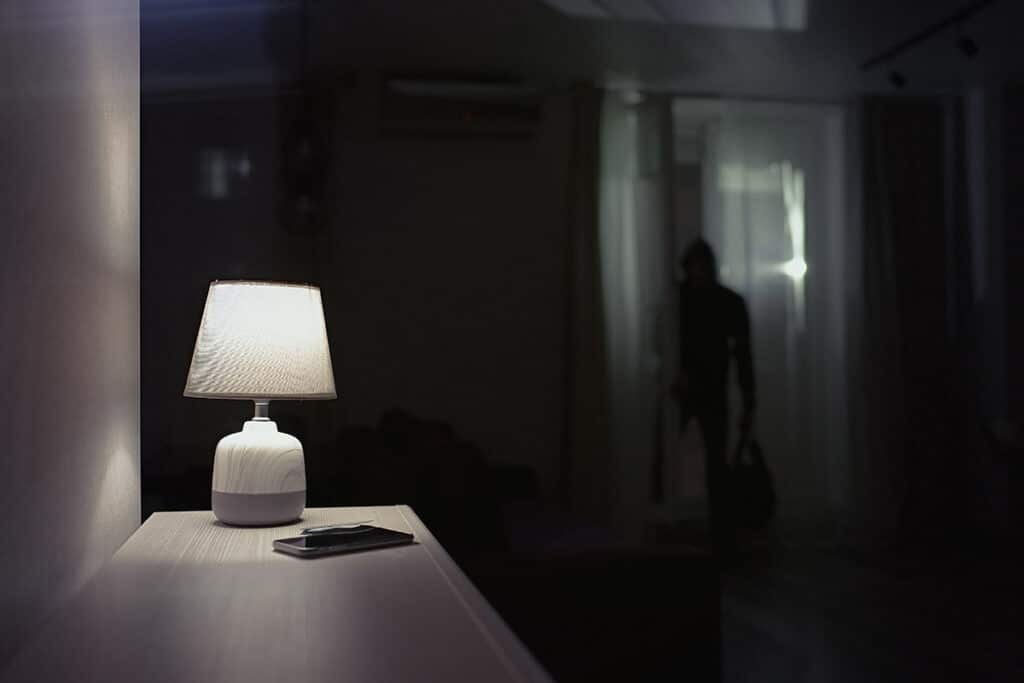Have you been charged with aggravated home invasion?
If you have been charged with aggravated home invasion, you need to consult an experienced criminal lawyer, before appearing in Court. In Victoria, aggravated home invasion is an offence under section 77B of the Crimes Act 1958. Aggravated home invasion is punishable by up to 25 years of imprisonment.
The offence of home invasion is a statutory alternative to aggravated home invasion (s 77C). If a jury is not satisfied that a person is guilty of a charge of ‘aggravated home invasion’, the person may still be liable for ‘home invasion’ (under s 77A).

Elements of aggravated home invasion
As with the alternative offence of ‘home invasion’, for a person to be convicted of aggravated home invasion, the prosecution must first prove that the accused committed a burglary of a home (s 77B(1)(a)).
The following elements must be proved beyond a reasonable doubt for a jury to find an accused guilty of aggravated home invasion:
- The accused committed burglary of a home;
- The accused entered the home in company with two or more other persons;
- At the time of entry the accused was armed;
- At the time of entry the accused knew or was reckless as to whether another person was present in the home while the accused is present; and
- While the accused was in the home, a person was present in the home.
Burglary of a home
For an accused person to be convicted of home invasion while armed or where a person is present, the prosecution must first prove that the accused committed a burglary of a home (s 77B(1)(a)).
For a detailed discussion of the elements required for ‘burglary of a home’, see Home Invasion or Burglary.
‘In company’ with two or more persons
The second element is that the accused entered the home ‘in company’ with two or more other persons (co-offenders) (s 77B(1)(b)), whereas the basic offence of home invasion may be committed with a single co-offender.
See Home Invasion for a detailed discussion of “in company”.
Home invasion while armed
The third element under section 77B(1)(c)(i) is that, at the time of the home invasion, the accused had one of the following items with them:
- A firearm;
- An imitation firearm;
- An offensive weapon;
- An explosive; or
- An imitation explosive.
The offence of Aggravated Burglary under section 77 defines these items further.
Knowledge or recklessness of a person being home
The fourth element under section 77B(1)(c)(ii) is that, at the time the accused entered the home, the accused either:
- Knew that a person was or would be present in the home; or
- Was reckless about whether a person, other than a co-offender, was or would be present.
This element will only be satisfied if the person present in the home was not a co-accused or a party assisting with the commission of the offence.
A person was present in the home
The final element is that while the accused was present in the home, another person, other than a person assisting with the commission of the offence, was present in the home (s 77B(1)(d)).
Defences to aggravated home invasion
If you have been charged with aggravated home invasion, you may have a valid defence, such as acting under duress or mistake of fact.
Penalties for aggravated home invasion
Aggravated home invasion under section 77B is liable to a maximum penalty of 25 years imprisonment.
Aggravated home invasion is subject to mandatory sentencing as a Category 1 offence under the Sentencing Act 1991 (Vic). This means that a court must impose a sentence of imprisonment with a non-parole period of at least three years for aggravated home invasion (Sentencing Act 1991 s 10AC(1)).
However, the statutory minimum sentence does not apply if the offender was under 18 at the time of the offence or if there is a “special reason” not to apply the statutory minimum (ss 10AC, 10AD).
In the higher courts, in the five years to 30 June 2021, the most common sentence for a charge of this offence was imprisonment (81% of charges), with the longest prison sentence being eight years and the shortest sentence being two years (Sentencing Advisory Council).
See our article ‘Aggravated Home Invasion, Children’s Court‘ for a recent case outcome for four co-accused charged with several offences, including home invasion.
Where will my case be heard?
Charges of aggravated home invasion will generally be heard in the County or Supreme Court. In cases where the intent to steal was for property with a total value under $100,000, the case may be heard in the Magistrates Court. Charges of aggravated home invasion with intent to cause property damage or assault must be heard in the County or Supreme Court.
What to do if you have been charged
Aggravated home invasion is a serious charge, and if found guilty, the range of penalties, aggravating and potentially mitigating factors mean that it is crucial to seek legal advice as early as possible.
A legal practitioner with specialist experience defending home invasion charges is essential to navigate this serious area of the law, plan your defence and achieve the best possible outcome.


